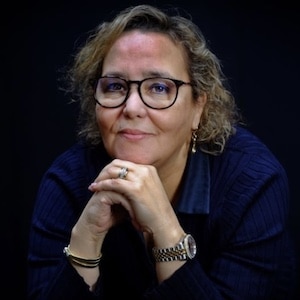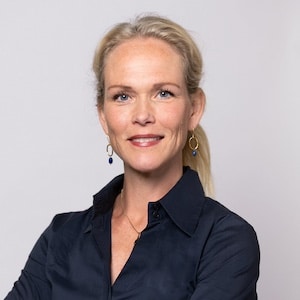Rahma el Mouden: ‘Without good housing, you can’t contribute’
It is time for a new perspective. A fundamentally different way of working together, based on inclusive prosperity. Entrepreneur and director Rahma el Mouden is ready. "Affordable housing and equal opportunity are the foundation of a prosperous metropolis."
We talked with Rahma el Mouden about Choosing what’s needed for the Metropolis of Tomorrow. Working on this call marked the start of the movement Look differently, act differently. This involves reviewing the issues we are working on and the decisions we make, based on nine principles. What do these mean to the entrepreneur? Would she make different choices?
El Mouden is founder and director of MAS service providers group. Its day-to-day management she has handed over to her daughter Oumaima el Mouden. As a director, Rahma el Mouden is committed to the Z3 Academy, a foundation for young people with very little future and job prospects. She also started RLD Platform, which helps young professionals find their dream job or take their business to the next level.

Rahma el Mouden
What did you notice about the principles?
“Everything that should be in it, is there. Anyone would agree we need to work with these nine principles . All would probably choose their own focal points. We clearly need to do this together. Companies I work with, I’ve noticed, are aware of their role and no longer want to leave it all to the government. Together, we can make an impact. Inclusive prosperity is given extra exposure, as it should be, and is reflected in various starting points. This is the basis for a prosperous metropolis.”
Can you explain that?
“In the Amsterdam Metropolitan Area, the lack of affordable housing and opportunity inequality is most concerning to me. Housing issues are a tragedy. Young people are staying longer with their parents or they have to move away from the city. All Amsterdam residents should be able to keep living here, including cleaners, security guards, nurses and police officers. Also for people who earn just too much to be eligible for the public housing sector and have to rent in the private sector. Some pay hundreds of euros for a small room, others are in sublets and thus have no voice. The quality standard of existing rental housing is often not high either: poorly insulated and too small. The housing crisis is directly related to opportunity inequality. Young people who live in low quality housing spend more time on the streets, where they may become involved in crime. Without quality housing, you can’t function or contribute to society.”
What would you tackle first if you were the boss of the Amsterdam metropolis?
“I have long had the dream of not placing young, struggling people separately in schools. I’d rather spread them across all schools. That way they also meet role models. I think all secondary schools in the metropolis should have a department where these young people can go. They would get in touch with other young people and we could reduce the inequality of opportunity.”
One of the principles is: We redesign the way we make choices and decisions that affect residents. What are your thoughts on that?
“Many citizens I interact with, do not feel seen. I am committed to making sure their voices are better heard so that government is there for all residents in the metropolis. A good example is Brasapark, over the Gaasperdammer Tunnel. Residents from Amsterdam Southeast were able to have a say in the design plan. Local people know better than anyone else what the neighbourhood needs. I am convinced that the city will become more beautiful, safer and cleaner if we listen to them more often.”
“The other day I was in New York on a working visit. There, civil society organisations, residents and the municipality form a strong triangle. In the neighbourhood I visited, the municipality was really part of the neighbourhood; officials were nearby and not just governing from City Hall. That worked very well.”
What role do companies have?
“Companies are increasingly aware that they can contribute not only to the economy, but also to inclusive prosperity. They know that the climate is also partly their responsibility. Companies are quite willing to contribute to opportunity inequality. They just lack experience. If something is not directly related to their core business, they prefer to have a ready-made programme to implement. I get that, but companies could make a little more effort. Be more critical of their suppliers, for example: how many people work there with labour market disadvantages? At Z3 Academy, young people learn employee skills and we get them ready to work.”
Anything else missing?
“I would like to see it become more tangible. For example: by 2025 we want to have this done, by 2030 all social housing must be sustainable. Fifty percent of the housing shortage must be solved by then. With figures like that you show courage. With that, the Amsterdam Economic Board can give direction to the world that is changing faster than we want it to.”
Read more interviews with partners about Look differently, act differently.
6 July 2023
Read more about
Contact us
Want to keep up to date?
Get the best regional news and events (in Dutch) via the Board Update newsletter
Share this news
Want to keep informed?
Follow us daily on LinkedIn and sign up for the Board Update newsletter.
Read more
- Adyen is one of the great success stories of Amsterdam’s tech ...
- Together with enthusiastic partners in three coalitions, the Amsterdam Economic Board is ...
- The top 100 AI tools based in the Amsterdam Metropolitan Area are shown ...


